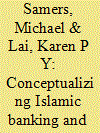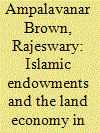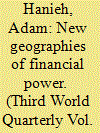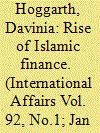|
|
|
Sort Order |
|
|
|
Items / Page
|
|
|
|
|
|
|
| Srl | Item |
| 1 |
ID:
152097


|
|
|
|
|
| Summary/Abstract |
In response to the limited engagement with critical social science concerning the governance of Islamic banking and finance (IBF), this paper compares and conceptualizes the development and governance of IBF in Malaysia and Singapore. We argue that IBF governance in Malaysia and Singapore can be distinguished on the basis of ethnic politics, moral suasion, product demand, product innovation, and the character of state practices. Concerning the latter, we contend that the political economy of both countries can be characterized as broadly involving a ‘neoliberal-developmentalism’, but we nuance this by positing a transition in Malaysia from a ‘semi-developmentalism’ in the 1980s to what we call an ‘Islamic and internationalising ordoliberalism’ beginning in the 2000s. In turn, the governance of IBF in Singapore involves a combination of neoliberal developmentalism, which nonetheless also entails some form of Islamic ordoliberalism.
|
|
|
|
|
|
|
|
|
|
|
|
|
|
|
|
| 2 |
ID:
138825


|
|
|
|
|
| Summary/Abstract |
This case study from Malaysia adds a new dimension to critiques of Islamic banking and finance (IBF) by studying various aspects of its agency and showing how its growth complements and sometimes supersedes its spiritual components, resulting in new power alignments. The first significant consequence of IBF has been its global role in an emergent multipolar financial and regulatory global space. Second, by the creation of new alliances and governing classes, it demonstrates a capacity for eschewing the encumbrances of older religious structures and institutions. IBF resonates well within the restructuring agenda of a post-neoliberal global financial order, while reshaping the meaning of religion through a post-secular worldview. Here is where the role of the new agents and authorial voices of Islamic commerce have become crucial in mediating the ethical and material tensions of IBF, acting as the free market reformers of once inflexible doctrines. Thus, the sustainability of IBF hinges upon the empowerment of this new class of secular agents. These agents of IBF find their legitimacy through the seemingly unlikely path of dereligionizing Islamic practices through commerce.
|
|
|
|
|
|
|
|
|
|
|
|
|
|
|
|
| 3 |
ID:
085886


|
|
|
|
|
| Publication |
2008.
|
| Summary/Abstract |
This paper emphasizes the deeply embedded economic interests of Islamic charities: the accumulation of land and property, commercial and financial activities, rather than their role in providing social welfare, educational opportunities, and facilities for individuals to perform the Hajj. These entrepreneurial priorities are global, since the waqf (Islamic endowment) is linked to the homeland of the founders in the Hadhramaut and to Saudi Arabia. The paper appraises the application and success of Islamic finance in the commercial exploitation of these assets. The focus then shifts to the role of shari'a law in determining and shaping the issuance of bonds and derivatives. Throughout the paper, attention is given to the nature of an 'ethical capitalism' that emerges, and a brief comparison is drawn with the Chinese or Confucianist Tong (lineage).
|
|
|
|
|
|
|
|
|
|
|
|
|
|
|
|
| 4 |
ID:
171247


|
|
|
|
|
| Summary/Abstract |
A growing body of critical scholarship has examined the recent growth of Islamic finance (IF), unpacking its ethical assertions and highlighting its close affinities with conventional financial instruments. Receiving less attention, however, is the relationship between the global expansion of IF and the emergence of new financial actors and zones of accumulation. This article situates the evolution of global Islamic circuits alongside processes of capital accumulation in the Gulf Cooperation Council (GCC), arguing that contemporary IF is deeply bound up with the internationalisation of capital groups headquartered in the GCC. This is evident in the internationalisation of GCC Islamic banks, which has given the Gulf a powerful foothold in new markets and a variety of sectors that are typically considered ‘non-financial’. Simultaneously, the expansion and geographical diversification of Islamic debt (sukuk) issuance is refashioning the Gulf’s relationships with other global spaces, a process that looks set to intensify given the widespread push to utilise IF in development financing. Seen from this perspective, the global growth of IF sits in a mutually constitutive relationship with patterns of capital accumulation in the Gulf, as well as the region’s burgeoning weight within (and new linkages to) the global economy.
|
|
|
|
|
|
|
|
|
|
|
|
|
|
|
|
| 5 |
ID:
145268


|
|
|
|
|
| Summary/Abstract |
Islamic finance signifies more than a projection of religious affiliation. The importance of Islamic finance is increasing in central Asia, both as a source of capital and as a form of post-colonial market-building. In central Asia, it is an important facet of the new phenomena of ‘nation-branding’ and a means of reinvigorating the economy. In identity politics, Islamic finance projects an attitude of religious tolerance allowing states in the region to reposition their geopolitical identity relative to the Islamic community. This creates a ‘performance’ of Islamic finance that facilitates the creation of legitimacy for the state. Adopting Islamic finance projects images of the state's religious tolerance and diversity without changing the underlying structures; it suggests an ‘Islamicness’ that is useful to the development and post-colonial goals of the state. As such, it creates opportunities for geopolitical alliances with Muslim countries. Economically, it appeals to rising financial-industrial elites seeking new investment-opportunities, which reduces pressure on the state to democratize. Meanwhile, in Russia, Islamic finance is an alternative source of capital for the sanctions-hit state and a useful identity marker with which to connect to the increasingly wary Caucuses and Commonwealth of Independent States countries, lending it a wider significance across Eurasia.
|
|
|
|
|
|
|
|
|
|
|
|
|
|
|
|
|
|
|
|
|